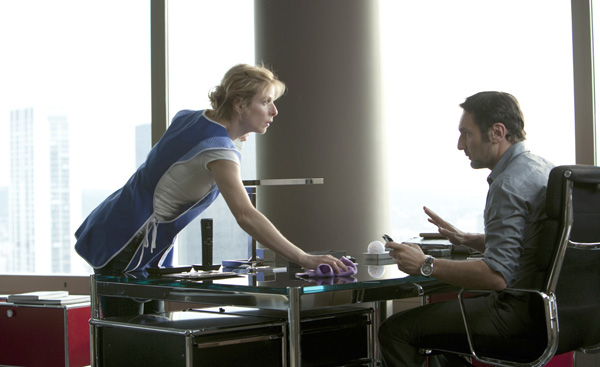
Karen Viard and Gilles Lellouche in MY PIECE OF THE PIE (Chantal Thomines Desmazures/Sundance Selects)
Written & Directed by Cédric Klapisch
Produced by Bruno Levy
Released by Sundance Selects
English & French with English subtitles
France. 109 min. Not rated
With Karin Viard & Gilles Lellouche
Cédric Klapischs boisterous films cram many characters and storylines into two (or so) hours. His last effort, Paris, was even more kaleidoscopic than usual, with the director adroitly juggling several relationships. Of course, having some of Frances best actors (including Fabrice Luchini and Juliette Binoche) on screen didnt hurt.
Now comes My Piece of the Pie. For this director, its almost an intimate chamber piece that revolves around two protagonistsor antagonists, as we shall see. In the seaside town of Dunkirk, heroine France (Karin Viard) is a 42-year-old single mother of three children who loses her factory job when the company she works for goes under as part of the global economic crisis. Meanwhile, in
Paris (and London), lives the financial whiz kid who personally caused Frances unemployment: charismatic anti-hero Steve. His lack of scruples extends from the board room to the bedroom, where hes taken aback when the supermodel hes wooing refuses to have sex with him after he flies her to Venice in his private plane.
After alternating between their separate worlds (the movie could also be called 99% vs. 1%), Klapisch finally gets to the nitty-gritty after Francedesperate for a job to keep her family togethertakes the train from Normandy to Paris to become a cleaning lady. Whom does she end up working for? You guessed it. Steve becomes Frances boss, and after many machinations that are undeniably clever but so obvious that you can spot them crawling up the Champs-Élysées, they end up as lovers, at least until Steve tells France (after their first night together) that he and his co-workers destroyed
her former employee and sent her adrift in our anything-but-brave new economic world.
My Piece of the Pie is nothing if not timely, and Klapisch enjoys showing what a rich bastard Steve is (at one point he says, unapologetically, Finance makes the world go round) and how much fun it is being a rich bastard (wooing supermodels, flying around Europe, having an eternal five oclock shadow). But the movie is too heavy-handed in its attempts to show that opposites really do attract.
The first half smartly sets up the conflict between France and Steve, but the second half falls apart as Klapisch muddies his message of responsibility and accountability with a shrill, feel-good revenge ending. Its bad enough that the movie heroines name is France, but during the films strange climax, the friendly crowds begin to yell France! France! France! Whats already been obvious is flagrantly underlined for those who still didnt get it during the first 105 minutes.
As France, Karin Viard carries an entire nations economic suffering on her shoulders. Although shes a luminous presence, there are momentswhen she impersonates a Russian bimbo during a dinner with Steves colleagues or dances with her kids to Roy Orbisons Pretty Womanwhere even she cant rescue the movie from Klapischs silliness.
The same goes for Gilles Lellouche, who has Steves impulsiveness, immaturity, and single-mindedness down pat. But except for a few tender moments with the executives young son, hes unable to create a coherent character. The film suffers as Klapisch seems content to keep his antagonistic couple one-dimensionally symbolic. In this underwhelming context, the film ends with a question markand its single subtle moment. But subtlety is all wrong in a movie that hammers home its points throughout.





